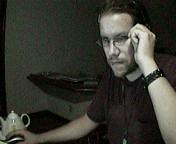tonight was another Kifune Discussion Group.
In it we spent a good amount of time discussing new developments and news items, some important topics were Rugg's verifier theory, and Chet Fleming's "If we can Keep a Severed Head alive." which isn't actually new, but Peter came in with discussions he had with KRONOS researcher Chris Heward, PhD.
The takeaway message, I think, is one of great personal interest to me, which is that achieving your goals requires a certain agnosticism of method. Verifier theory shows that subspecialists miss important details. The difficulty of anti-aging research and medicine in general shows that we are perhaps asking the wrong questions in many cases. We could probably grind away at things like Alzheimers and Cancer for a long long time, if we confine ourselves to piecemeal and directed solutions to existing problems.
The universe, I think has no particular trend to keep us from achieving great aims as compared to small ones. But it does have laws and it's own character. It's important to keep in mind that end results are far more achievable than certain methods to end results.
One thing that might actually help scientists a great deal is if they organized themselves along the lines of what they were trying to achieve or investigate, rather than what means and mechanisms they used to achieve it. One would be an Alzheimer researcher rather than a stem-cell researcher, or a behavioral modifier rather than a neuroscientist. It would help to cut across bodies of knowledge. And make clearer the role of specialization, which is to allow deep exploration and immersement in some methods to some ends.
The key, with great ambitions, is to have goals, but not to become too attached to attendant details. Pragmatism applies harshly to methods, but not to goals. You can have insane pie in the sky plans, so long as you learn and flow into the shape that the data on those plans show you.
If the only way to live forever is some magical fruit in the middle of the sahara desert, then well, pack your sandtent, and stop your Genetic engineering. I like to think that I've forced myself into this role, and taken on skills as they are forced upon me, rather than accreting tendencies and allowing them to point me in an ultimate direction.
This may not be to some people's taste, of course. Some people genuinely care mostly about their methods and techniques, and that is fine. But clarity on this should help you too. If all you want is to explore the space of laser correction of vision, or to explore the power of some subtype of music, fine. Say that. Work towards it. You aren't looking for the best way to help people see, or the next wave in music. You want to do what you are doing, and do it well. That is a perfectly legit desire. And perhaps you will be able to strive towards it more directly after determining that.
Of course, verifier theory is in it's infancy, and I have yet to accomplish much of consequence to the wider world. So these musing should be taken in much the same light as they are formed, exploratory, mildly confident, and seeking to approximate the truth.
Sunday, September 05, 2004
Subscribe to:
Post Comments (Atom)

No comments:
Post a Comment